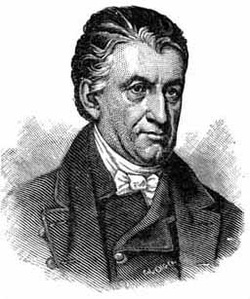BEECHER, LYMAN

(12 October 1775, New Haven, CT-I0 January 1863, Brooklyn, NY). Education: B.A., Yale College, 1797; studied theology under Timothy Dwight*, 1797-98. Career: Minister, Presbyterian church, East Hampton, Long Island, 1799-1810; minister, Congregational church, Litchfield, CT, 1810-26; minister, Hanover Street Congregational Church, Boston, MA, 1826-32; minister, Second Presbyterian Church, Cincinnati, OH, 1833-43; president and Professor of Theology, Lane Seminary, Cincinnati, OH, 1832-50.
Born a few weeks after the beginning of the American Revolution, Lyman Beecher lived to see the beginning of the Civil War. His causes included both religious and secular issues, a blending of interests typical of the ministers in the early national period. Beecher's sermon on dueling, preached in 1806 shortly after the death of Alexander Hamilton, was widely read and contributed to a public reaction against the custom. In 1825 he preached six sermons on the evil of drinking that were published in the United States and abroad. His sermons criticizing Catholic immigrants contributed to the hysteria that resulted in the burning of the Ursuline convent in Boston in 1834. He was president of Lane Seminary in 1834 when Theodore Dwight Weld, protesting against a college rule (which Beecher himself disliked) forbidding the discussion of slavery, withdrew from the college and led a group of followers to Oberlin.
In some respects a religious conservative-he denounced the Unitarian theology and opposed disestablishment in Connecticut-Beecher adapted easily to changing circumstances in American religious life. When voluntary support for the church became law in 1818, he came to see the change as an incentive for dynamic religious leadership. He at first opposed, them embraced Charles G. Finney's "new measures" in revivalism. Despite his zealous defense of Trinitarianism, he so emphasized the new school principle of human effort in salvation that he was tried for heresy in 1835. The trial, in which he was acquitted, was less a test of Beecher's orthodoxy than a sign of the divisions within the shaky Presbyterian-Congregational alliance during the 1830s, and it contributed to the division of 1837-38.
Seven of Beecher's sons became ministers, and three daughters, including Harriet Beecher Stowe*, were writers and philanthropists.
Bibliography
A: A Plea for the West (Cincinnati, 1832); Views of Theology (Cincinnati, 1836); Works, 3 vols. (Boston, 1852-53); Charles Beecher, ed., Autobiography, Correspondence. Etc., of Lyman Beecher, D.D., 2 vols. (New York, 1864-65; new ed., Barbara Cross, ed. Cambridge, MA, 1961); J. C. White, ed., Personal Recollections of Lyman Beecher (New York, 1882).
B: DAB 2, 135-36; DARB, 37-39; NCAB 3, 126-28; NIT 12 January 1863, 5; SH 2, 25; E. F. Haywood, Lyman Beecher (Boston, 1904); Lyman B. Stowe, Saints, Sinners, and Beechers (New York, 1934); Charles R. Keller, The Second Great Awakening in Connecticut (New Haven, 1942); George M. Marsden, The Evangelical Mind and the New School Presbyterian Experience (New Haven, 1970); Stuart C. Henry, Unvanquished Puritan: A Portrait of Lyman Beecher (Grand Rapids, MI, 1973); Lars Osterline, "New England-Puritanismens Forvandling" [The revision of New England Puritanism], Kyrkohistorisk Arsskrift 64 (1965) 239-54.
Born a few weeks after the beginning of the American Revolution, Lyman Beecher lived to see the beginning of the Civil War. His causes included both religious and secular issues, a blending of interests typical of the ministers in the early national period. Beecher's sermon on dueling, preached in 1806 shortly after the death of Alexander Hamilton, was widely read and contributed to a public reaction against the custom. In 1825 he preached six sermons on the evil of drinking that were published in the United States and abroad. His sermons criticizing Catholic immigrants contributed to the hysteria that resulted in the burning of the Ursuline convent in Boston in 1834. He was president of Lane Seminary in 1834 when Theodore Dwight Weld, protesting against a college rule (which Beecher himself disliked) forbidding the discussion of slavery, withdrew from the college and led a group of followers to Oberlin.
In some respects a religious conservative-he denounced the Unitarian theology and opposed disestablishment in Connecticut-Beecher adapted easily to changing circumstances in American religious life. When voluntary support for the church became law in 1818, he came to see the change as an incentive for dynamic religious leadership. He at first opposed, them embraced Charles G. Finney's "new measures" in revivalism. Despite his zealous defense of Trinitarianism, he so emphasized the new school principle of human effort in salvation that he was tried for heresy in 1835. The trial, in which he was acquitted, was less a test of Beecher's orthodoxy than a sign of the divisions within the shaky Presbyterian-Congregational alliance during the 1830s, and it contributed to the division of 1837-38.
Seven of Beecher's sons became ministers, and three daughters, including Harriet Beecher Stowe*, were writers and philanthropists.
Bibliography
A: A Plea for the West (Cincinnati, 1832); Views of Theology (Cincinnati, 1836); Works, 3 vols. (Boston, 1852-53); Charles Beecher, ed., Autobiography, Correspondence. Etc., of Lyman Beecher, D.D., 2 vols. (New York, 1864-65; new ed., Barbara Cross, ed. Cambridge, MA, 1961); J. C. White, ed., Personal Recollections of Lyman Beecher (New York, 1882).
B: DAB 2, 135-36; DARB, 37-39; NCAB 3, 126-28; NIT 12 January 1863, 5; SH 2, 25; E. F. Haywood, Lyman Beecher (Boston, 1904); Lyman B. Stowe, Saints, Sinners, and Beechers (New York, 1934); Charles R. Keller, The Second Great Awakening in Connecticut (New Haven, 1942); George M. Marsden, The Evangelical Mind and the New School Presbyterian Experience (New Haven, 1970); Stuart C. Henry, Unvanquished Puritan: A Portrait of Lyman Beecher (Grand Rapids, MI, 1973); Lars Osterline, "New England-Puritanismens Forvandling" [The revision of New England Puritanism], Kyrkohistorisk Arsskrift 64 (1965) 239-54.
